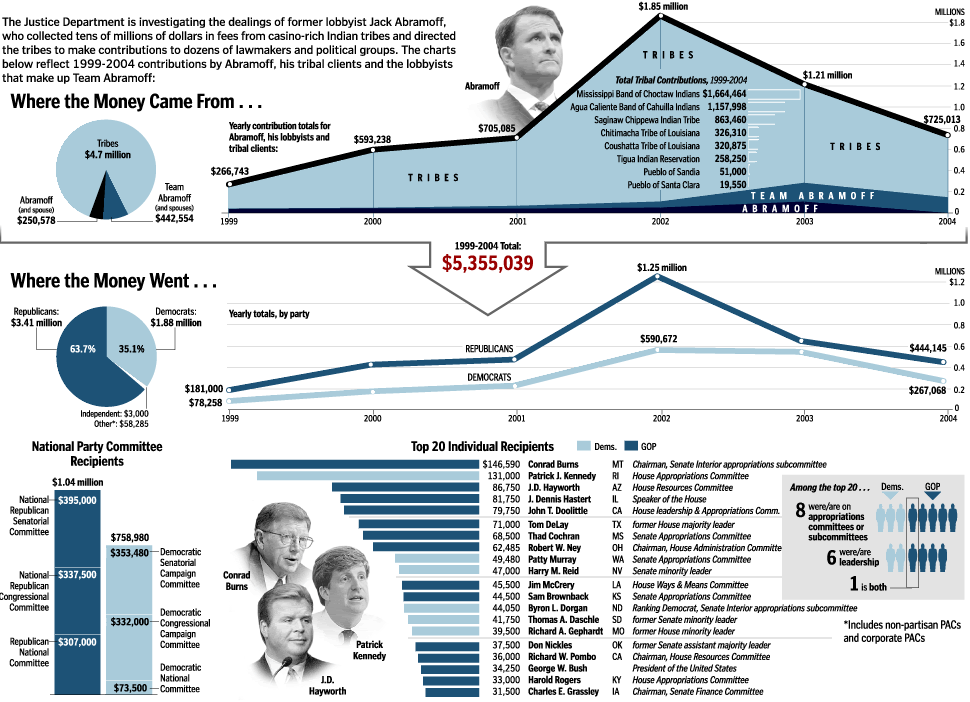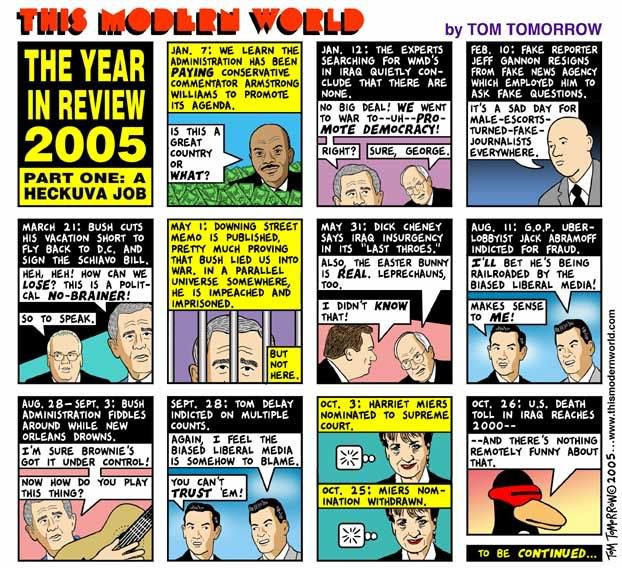
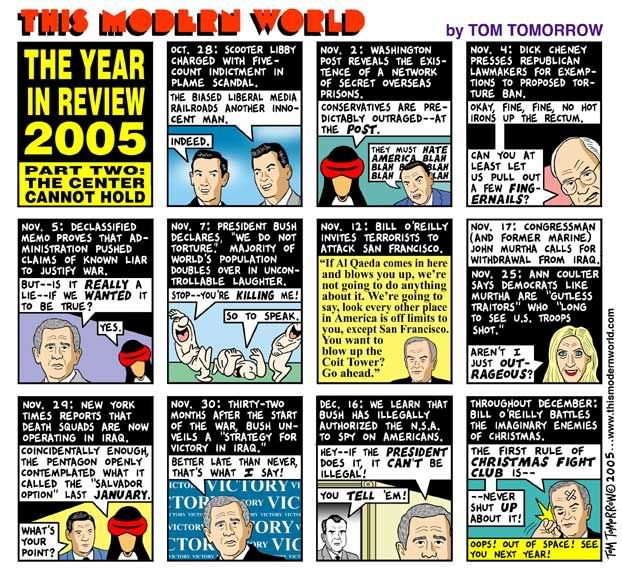
Commentary on politics, economics, and samplings from the alternative media because... the television is lying...

SEC. RUMSFELD: Mr. Congressman, thank you very much. Your question is, of course, right at the heart of an enormously important issue for the Department of Defense. We have a panel in the Quadrennial Defense Review on this subject. We have met with it twice in the last two weeks. We're obviously going to have to meet with it again. It is a big, broad, complicated subject.
As you know, the Department of Defense really is not in charge of its civilian workforce, in a certain sense. It's the OPM, or Office of Personnel management, I guess. There are all kinds of long- standing rules and regulations about what you can do and what you can't do. I know Dr. Zakheim's been trying to hire CPAs because the financial systems of the department are so snarled up that we can't account for some $2.6 trillion in transactions that exist, if that's believable. And yet we're told that we can't hire CPAs to help untangle it in many respects.
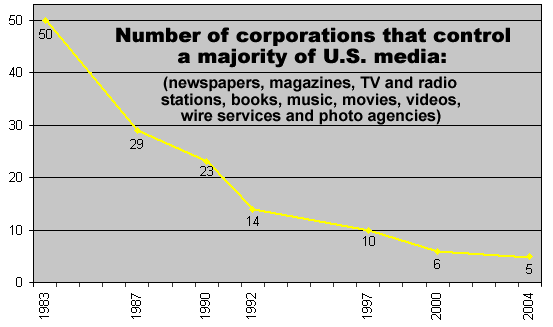
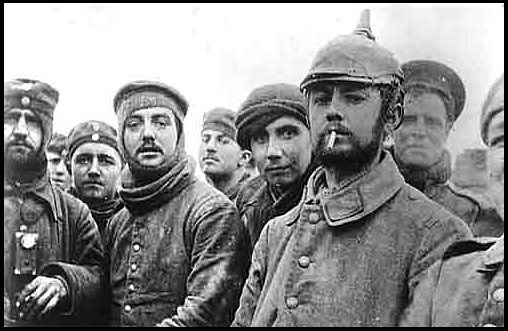
On Christmas Day, 1914, in the first year of World War I, German, British, and French soldiers disobeyed their superiors and fraternized with "the enemy" along two-thirds of the Western Front. German troops held Christmas trees up out of the trenches with signs, "Merry Christmas." "You no shoot, we no shoot."
Thousands of troops streamed across a no-man's land strewn with rotting corpses. They sang Christmas carols, exchanged photographs of loved ones back home, shared rations, played football, even roasted some pigs.
Soldiers embraced men they had been trying to kill a few short hours before. They agreed to warn each other if the top brass forced them to fire their weapons, and to aim high.
A shudder ran through the high command on either side. Here was disaster in the making: soldiers declaring their brotherhood with each other and refusing to fight.
Generals on both sides declared this spontaneous peacemaking to be treasonous and subject to court martial.
By March, 1915 the fraternization movement had been eradicated and the killing machine put back in full operation. By the time of the armistice in 1918, fifteen million would be slaughtered.
Not many people have heard the story of the Christmas Truce. Military leaders have not gone out of their way to publicize it.
On Christmas Day, 1988, a story in the Boston Globe mentioned that a local FM radio host played "Christmas in the Trenches," a ballad about the Christmas Truce(MP3 Here), several times and was startled by the effect. The song became the most requested recording during the holidays in Boston on several FM stations.
"Even more startling than the number of requests I get is the reaction to the ballad afterward by callers who hadn't heard it before," said the radiohost. "They telephone me deeply moved, sometimes in tears, asking, `What the hell did I just hear?'"
I think I know why the callers were in tears. The Christmas Truce story goes against most of what we have been taught about people. It gives us a glimpse of the world as we wish it could be and says, "This really happened once." It reminds us of those thoughts we keep hidden away, out of range of the TV and newspaper stories that tell us how trivial and mean human life is. It is like hearing that our deepest wishes really are true: the world really could be different.
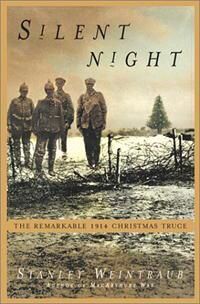
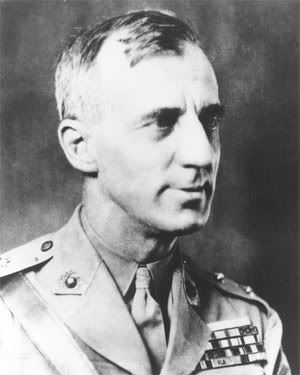
WAR is a racket. It always has been.
It is possibly the oldest, easily the most profitable, surely the most vicious. It is the only one international in scope. It is the only one in which the profits are reckoned in dollars and the losses in lives.
A racket is best described, I believe, as something that is not what it seems to the majority of the people. Only a small "inside" group knows what it is about. It is conducted for the benefit of the very few, at the expense of the very many. Out of war a few people make huge fortunes.
In the World War [I] a mere handful garnered the profits of the conflict. At least 21,000 new millionaires and billionaires were made in the United States during the World War. That many admitted their huge blood gains in their income tax returns. How many other war millionaires falsified their tax returns no one knows.
How many of these war millionaires shouldered a rifle? How many of them dug a trench? How many of them knew what it meant to go hungry in a rat-infested dug-out? How many of them spent sleepless, frightened nights, ducking shells and shrapnel and machine gun bullets? How many of them parried a bayonet thrust of an enemy? How many of them were wounded or killed in battle?
Out of war nations acquire additional territory, if they are victorious. They just take it. This newly acquired territory promptly is exploited by the few – the selfsame few who wrung dollars out of blood in the war. The general public shoulders the bill.
And what is this bill?
This bill renders a horrible accounting. Newly placed gravestones. Mangled bodies. Shattered minds. Broken hearts and homes. Economic instability. Depression and all its attendant miseries. Back-breaking taxation for generations and generations.
For a great many years, as a soldier, I had a suspicion that war was a racket; not until I retired to civil life did I fully realize it. Now that I see the international war clouds gathering, as they are today, I must face it and speak out.
I spent 33 years and four months in active military service and during that period I spent most of my time as a high class muscle man for Big Business, for Wall Street and the bankers. In short, I was a racketeer, a gangster for capitalism. I helped make Mexico and especially Tampico safe for American oil interests in 1914. I helped make Haiti and Cuba a decent place for the National City Bank boys to collect revenues in. I helped in the raping of half a dozen Central American republics for the benefit of Wall Street. I helped purify Nicaragua for the International Banking House of Brown Brothers in 1902–1912. I brought light to the Dominican Republic for the American sugar interests in 1916. I helped make Honduras right for the American fruit companies in 1903. In China in 1927 I helped see to it that Standard Oil went on its way unmolested.
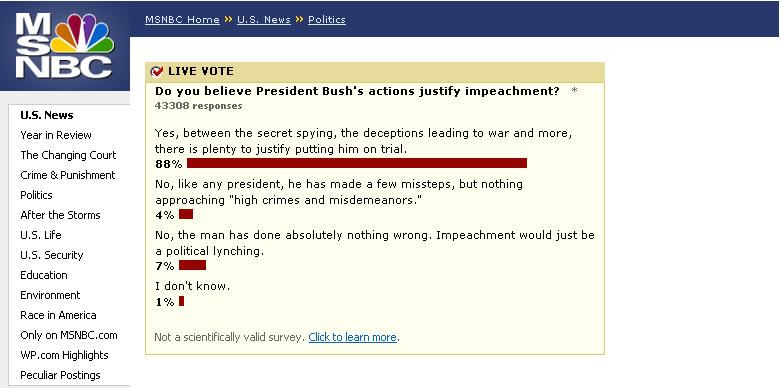

Last month, Republican Congressional leaders filed into the Oval Office to meet with President George W. Bush and talk about renewing the controversial USA Patriot Act.
Several provisions of the act, passed in the shell shocked period immediately following the 9/11 terrorist attacks, caused enough anger that liberal groups like the American Civil Liberties Union had joined forces with prominent conservatives like Phyllis Schlafly and Bob Barr to oppose renewal.
GOP leaders told Bush that his hardcore push to renew the more onerous provisions of the act could further alienate conservatives still mad at the President from his botched attempt to nominate White House Counsel Harriet Miers to the Supreme Court.
“I don’t give a goddamn,” Bush retorted. “I’m the President and the Commander-in-Chief. Do it my way.”
“Mr. President,” one aide in the meeting said. “There is a valid case that the provisions in this law undermine the Constitution.”
“Stop throwing the Constitution in my face,” Bush screamed back. “It’s just a goddamned piece of paper!”
I’ve talked to three people present for the meeting that day and they all confirm that the President of the United States called the Constitution “a goddamned piece of paper.”

We put our reputation on the line every time we publish a story that depends on information from anonymous sources. Sometimes we get burned and when we do we admit it publicly, take our well-deserved lumps, and move on.
In 2003, we published reports that intelligence professionals had raised doubts about the existence of weapons of mass destruction in Iraq and questioned claims of a link between Saddam Hussein and Osama bin Laden. Our detractors claimed we made the whole thing up. Two years later, we were proven right.
Last year, when we published reports on the President’s increasing temper tantrums, the doubters again claimed the reports were fantasy. Yet mainstream media outlets reported the same thing this year. We were right…and we got it first.
We were the first news outlet to identify the names of women who claimed sexual abuse by Bill Clinton when he was attorney general and later governor of Arkansas. We were the first news outlet to report on the ethical problems of many members of Congress in our series: America’s Criminal Class: The Congress of the United States. And we were the first to report on the abuse of underage girls on teen model web sites. Links to all of these award-winning stories can be found on our home page.
That doesn’t mean you should take everything we print as gospel. Never do that with us or any other news source. Do your own research and reach your own conclusions. And consider the record of the sources you use for news and information. We’ve published more than 25,000 stories since going online on October 1, 1994, and we’ve had to retract two of them. That’s a record I’m willing to stand on.
So the next time somebody calls Capitol Hill Blue a “garbage site” or claims I’m a clown, ask them for their qualifications and background. Did they get their information from credible sources or some anonymous poster on a partisan bulletin board or a blogger with a political ax to grind?
My bio can be found on this link. I put my name on everything I write. And I stand behind what I write. I’m an arrogant, stubborn, driven bastard who takes no prisoners and backs down from no one.
When I’m wrong, I admit it. Thankfully, I haven’t had to do that very often.
When I’m right I don’t give a damn who doesn’t like it or what they say about it.
An editor who taught me a lot once said: “If you piss off both sides you’re doing your job.”
That’s good enough for me.

